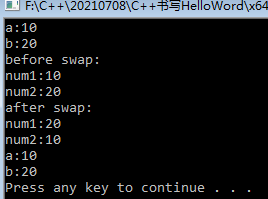? ? ? ? 作用:将一段经常使用的代码封装起来,减少重复代码,一个较大的程序,一般分为若干个程序块,每个模块实现特定的功能。
1. 定义
定义:
- 返回值类型
- 函数名
- 参数列表
- 函数体语句
- return表达式
语法:
返回值类型 函数名(参数1, 参数2, …)
{
函数体语句
return 表达式
}
#include<iostream>
using namespace std;
int add(int num1, int num2)
{
int sum = num1 + num2;
return sum;
}
int main()
{
cout << add(3, 4) << endl;
system("pause");
return 0;
}
2. 函数的调用
- 功能:使用定义好的函数
- 语法:函数名(参数)
#include<iostream>
using namespace std;
int add(int num1, int num2)
{
int sum = num1 + num2;
return sum;
}
int main()
{
//main函数中调用add
int a = 10;
int b = 20;
int c = add(a, b);
cout << c << endl;
a = 100;
b = 500;
c = add(a,b);
cout << c << endl;
system("pause");
return 0;
}
3. 值传递
- 含义:所谓值传递,就是函数调用时将实参数值传入给形参
- 值传递时,如果形参发生变化,并不会影响实参
#include<iostream>
using namespace std;
//定义函数,两个数进行交换
//无return 用void
void swap(int num1, int num2)
{
cout << "before swap:" << endl;
cout << "num1:" << num1 << endl;
cout << "num2:" << num2 << endl;
int temp = num1;
num1 = num2;
num2 = temp;
cout << "after swap:" << endl;
cout << "num1:" << num1 << endl;
cout << "num2:" << num2 << endl;
}
int main()
{
//main函数中调用add
int a = 10;
int b = 20;
cout << "a:" << a << endl;
cout << "b:" << b << endl;
swap(a, b);
cout << "a:" << a << endl;
cout << "b:" << b << endl;
system("pause");
return 0;
}
4. 函数的常见样式
- 无参无返
- 有参有返
- 无参有返
- 有参无返
#include<iostream>
using namespace std;
//函数常见样式
//无参无返
void test01()
{
cout << "test01" << endl;
}
//有参无返
void test02(int a)
{
cout << "test02:" << a << endl;
}
//无参有返
int test03()
{
cout << "test03" << endl;
return 250;
}
//有参有返
int test04(int b)
{
cout << "test03" << endl;
return b;
}
int main()
{
test01();
int a = 10;
test02(a);
test03();
int b = 23;
test04(b);
system("pause");
return 0;
}

5. 函数的声明
- 作用:告诉编译器函数名称以及如何调用函数,函数的实际主体可以单独定义
#include<iostream>
using namespace std;
//函数的声明
//比较函数
//提前告诉编译器函数的存在,可以利用函数的声明
//VS2019可以不用声明
//声明可以有多次,定义只能一次
int max(int a, int b);
int main()
{
int a = 10;
int b = 20;
cout << max(a, b) << endl;
system("pause");
return 0;
}
//定义
int max(int a, int b)
{
return a > b ? a : b;
}
6. 函数的分文件编写
- 作用:让代码结构更为清晰
步骤:
- 创建后缀名为.h的头文件
- 创建后缀名为.cpp的源文件
- 在头文件中写函数的声明
- 在源文件中写函数的定义
swap.h
#include<iostream>
using namespace std;
//函数的声明
void swap(int a, int b);
swap.cpp
#include "swap.h"
//定义
void swap(int a, int b) {
int temp = a;
a = b;
b = temp;
cout << a << endl;
cout << b << endl;
}
test.cpp
#include<iostream>
#include "swap.h"
using namespace std;
//- 1. 创建后缀名为.h的头文件
//- 2. 创建后缀名为.cpp的源文件
//- 3. 在头文件中写函数的声明
//- 4. 在源文件中写函数的定义
int main()
{
int a = 10;
int b = 20;
swap(a,b);
system("pause");
return 0;
}

